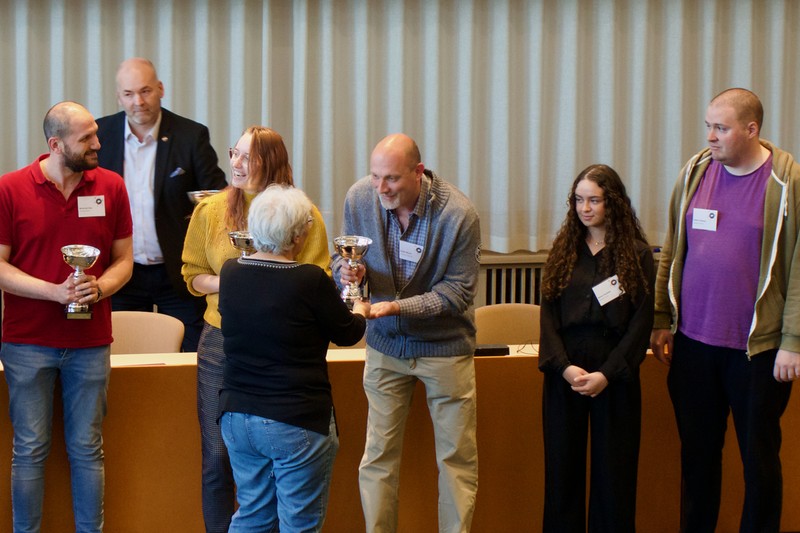Zoltán Mészár, assistant professor at the Institute of Anatomical Histology and Development at the Faculty of Medicine, won first prize as a member of an international team at the NeurotechEU Hackathon competition in Stockholm. They were given the task of finding an innovative solution to the problem of young people with mental illness, writes unideb.hu.
Researchers and students from European universities met at the NeurotechEU Hackathon held in the Swedish capital, Karolinska Institutet. The University of Debrecen (DE) was able to delegate a five-person team to the two-day competition, which included Zoltán Mészár, an assistant professor at the Department of Anatomy and Development of the DE ÁOK. The delegates were given the task of working in teams with participants from other countries to develop their own idea with an innovative technological solution that would help in the treatment of an incipient mental illness affecting young adults. Zoltán Mészár collaborated with researchers from Elche in Spain, Rerjkjavik in Iceland, Lille in France, Bonn in Germany, Karolinska in Sweden, and a university in Istanbul, Turkey.
Our subject was a young girl struggling with panic attacks, described as a geek by her peers. He studies a lot and very well, yet he is always afraid that he is not good enough, which causes him to have panic attacks. When someone has a panic attack like this, they need help within minutes. There is no time to wait for the ambulances to arrive because he really feels like he is about to die and has symptoms similar to a heart attack. We designed a mobile phone application to solve the problem of overwork. According to our solution, the person has no choice but to take out his phone, which he may still be able to do and press a big red panic button in the application
– explained Zoltán Mészár.
The team members assumed that the application would alert psychiatrists, psychologists, and volunteer helpers who were also installing it and were staying nearby, a few minutes away. They can decide whether to go there to help, call an ambulance or just call the patient to ask what he needs, and whether the seizure is over. Finding the patient could also be done using GPS.
Fortunately, we quickly realized that we cannot provide a solution for everything related to the disease, so we have to highlight a partial problem and focus on it. I think the other teams wanted to solve too many things at once, which is why we succeeded. In the work of the others, I did not see this super-simplicity, or that they could be a real product by tomorrow. Our solution requires only one programmer and is already ready and ready to use
– assessed the assistant professor.
When applying for the competition, the participants had to fill out a questionnaire assessing competencies, the organizers probably assembled the teams based on this. Most of the formations had a senior member like Zoltán Mészár, but everyone started to fulfill the task as equals.
The fact that one of my teammates was familiar with the fictitious patient helped us a lot in developing our solution, so we were able to better work out what a panic patient might need. It was also an advantage for us that both the Spanish and the Icelandic students understood IT
– explained the expert.
Zoltán Mészár also reported that at the beginning of the competition, a mini-competition was held, where they had to build the highest possible castle out of spaghetti and powdered sugar in 10 minutes.
We failed at this. We came last because we didn’t cooperate. We understood then and there that we could not continue with this attitude. To achieve success, it was necessary to respect each other’s values, to be open and honest with each other. With us, everyone worked on the task with full effort and humility, we didn’t have a member who pulled out even a little bit, we excluded everything else
– he recalled.
Zoltán Mészár previously worked for two years at the University of Fribourg, where he collaborated with Portuguese, Italian, Greek and Indian colleagues, so working in an international team was not unusual for him. At the same time, he last participated in a scientific competition as a university student, at the Scientific Student Conference, more than 20 years ago.
He said:
the team members have been in contact with each other since the competition and are working on making the application a downloadable product within half a year. They are currently trying to raise the funds necessary for implementation.

















